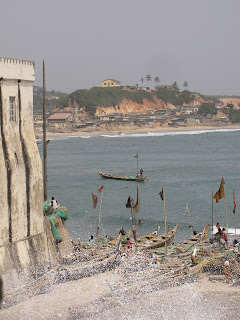
Jetlag is finally over (the day before we go home), but I’m glad to finally feel a little better physically. However, I’m just so heartbroken about the state of the education in this place (not that it is much different from many state schools in the US), and the limitations society has placed on these children who can do anything except hear, I get distraught about my inability to change anything meaningful, and how ineffectual this short trip is. I found myself bouncing between those feelings of despair, and a real desire to come back for a longer trip and see if I can actually affect a change, back to wondering if there was any kind of impact really happening.
Part of our party was off looking at local churches, so I sat around and talked to Rachel and Aaron. I found myself repeating something that is constantly asked of Pablo: “You know almost no dads learn to sign with their kids right?” He answered with the same I-did-what-I-did-because-I-love-my-child that Pablo always uses, in the same tired tone.

The conversation would around personality and life and way from the topic, but I was yet again struck by my first impression of Aaron Coleman(alright, second. The first one was, “Wow, he’s tall!”): What a great Dad.
Then M- and H- showed up. This was while Ronai and Jen were being church-napped, by the way. When we told M- what they had planned to do: head over to peek in the church windows and get a little glimpse) he started to laugh uncontrollably. He told us there was no way that they were going to be able to sneak anywhere, being obrunis, and that they’d probably be dragged to the front of the church, the congregation would make a huge deal about their presence, and they’d have a hard time escaping. He said they’d be lucky to avoid getting baptized into a new faith against their will, a thought that all of us found absolutely hilarious.
M- caught us up on his educational adventure, now that he’s at the University and has completed his basic college education. Watching this man talk about coming up through the higher education system in Ghana, mostly without interpreters, and how hard he’d had to fight to merely get into college, much less through it, blew me away. Then, as he talked about his time at the University now, his plans for grad school, and how there were more than a dozen people following in his footsteps, I was heartsick and amazed.
I was reminded of a conversation I’d just had up at the school with one of the high school Given that shift in perspective, the experience was a positive view of all the possibilities looming on the horizon for these children. When one high school boy told me he wanted more than to simply go to college and University and come back as a teacher of the Deaf, my heart swelled. When Curry started Signs of Hope International, and they began their work in Ghana nine years ago, even that outcome would have been out of this boy's reach. That's astoundingly fast progress in such a short time.

Lunch completed, we trudged back up to the school to “entertain” the kids for a few hours. It was great fun, and I was able to pick up the skirts that E-, the sewing teacher had made for me. We wandered around outside with the kids, as they hugged us and mugged for the camera.


Then we headed inside the cafeteria for some shade. Once inside, some of the older kids ignored us and watched a soccer game ... I mean ... “football match” on the single TV. The younger kids, however, were thrilled to see us, and we goofed around quite a bit. Then, one older middle school girl came up to me and asked if we were going home the next day. I said yes. She got indignant and angry, and asked me, pointedly, why we’d come if we were only going to stay for such a short visit. What could we possibly have accomplished in that short of an amount of time?
Three or four hours before, I’d have responded with, “Good point” or “At least we’re trying to do some good.” However, after the talk with M-, his wife, and jotting down the experiences with the tour guide at Cape Coast, and the Ranger at Kakum, I felt like I was able to answer her:
“We came because each of us has some connection to the Deaf community in our home, and we wanted to learn from you. We also have experience being hearing signing people, and that we had knowledge we could share with them, and their teachers. We wanted to see how much their school had improved, and to share that with the people back home, and we wanted to remind them that they could do anything hearing people could do, despite what cultural roadblocks they came to. I told her about all the people we’d met and talked to, and that as hearing, obruni tourists we were able to go many places (Cape Coast, Kakum) that they had never been (because they are residential students) and communicate with many people they could not (because they were Deaf). With our access, we were able to talk to people, force them to confront their prejudices and change their perspectives, and that if we only managed to change the outlook of a few people, they might talk to their friends and family. That’s how perception shifts change."
Pablo, of course, filmed part of the exchange:

Aaron Coleman with his camera, of course.

















































